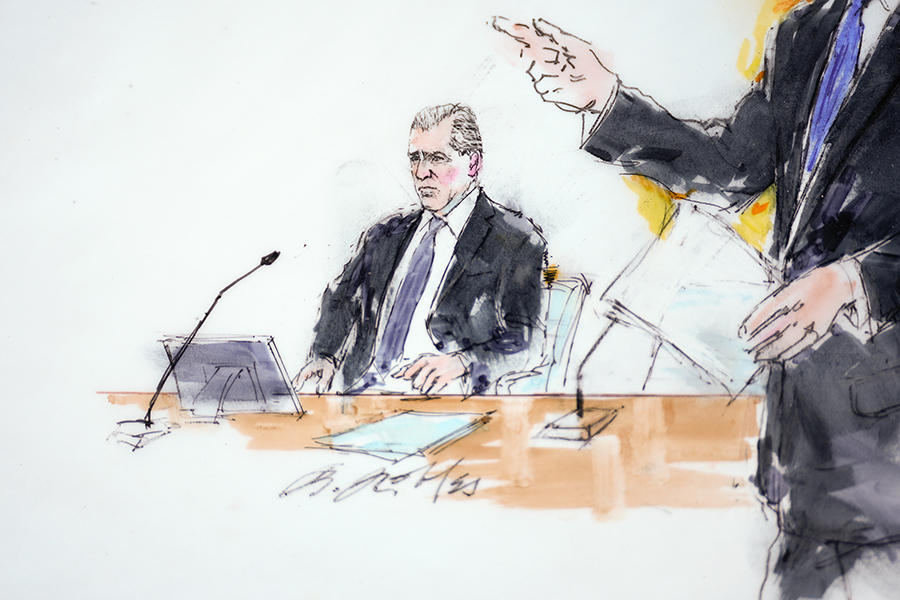
Lawyers for Hunter Biden officially requested a new gun trial Monday, saying the trial judge didn’t have jurisdiction over his case because of a legal technicality.
The move comes a week after attorneys for President Biden’s son filed the same motion before mysteriously withdrawing it minutes later, days after he was convicted of unlawfully owning a gun while hooked on drugs.
In the new motion, Hunter, 54, asked for his June 17 conviction to be scrapped, claiming Delaware federal Judge Maryellen Noreika didn’t have jurisdiction over the trial because of pending rulings in his appeals case.
A three-judge panel of the Third Circuit Court of Appeals rejected two of the Biden scion’s appeals earlier this year, finding they couldn’t rule until a verdict in the case.
But Hunter’s team says the appellate court didn’t yet rule on his request to have a full panel of judges hear his two appeals, which delayed the Third Circuit issuing a mandate that would have officially returned the case to Noreika.
“Here, no mandate was issued during the trial or even now, and the Special Counsel did not move the Third Circuit for an expedited mandate after it ruled,” Hunter’s lawyers wrote in a filing from Monday. “Consequently, the conviction must be vacated.”
— Priscilla DeGregory and Josh Christenson in Hunter Biden’s Lawyers Officially Seek New Trial After Gun Conviction

A wiggle worm has nothing on these lawyers.
I’d have to hit the books to see if a lack of the appellate mandate is jurisdictional in the case of an interlocutory appeal, and/or can that be waived by the defense not timely raising it.
If no appellate mandate turns out to be jurisdictional and nonwaivable, then once again it shows how deep in the tank DoJ has been for the Bidens. If Hunter had been acquitted, they’d say jeopardy attached and barred any retrial. If he’s convicted, “oops. . . we didn’t make sure the appellate mandate issued. Our bad.”
I said since they charge him: Biden needs to lose at trial so he can win on appeal. If he won at trial, it would only benefit him and him alone.
I looked it up for all of you. He will lose the appeal: US DeFries, 129 F.3d 1293 (1997);
“The relationship between district court jurisdiction and the issuance of the appeals court mandate is clear and well-known: The filing of a notice of appeal, including an interlocutory appeal, “confers jurisdiction on the court of appeals and divests the district court of control over those aspects of the case involved in the appeal.” Griggs v. Provident Consumer Discount Co., 459 U.S. 56, 58, 103 S.Ct. 400, 402, 74 L.Ed.2d 225 (1982) (per curiam). The district court does not regain jurisdiction over those issues until the court of appeals issues its mandate. Johnson v. Bechtel Associates Professional Corp., 801 F.2d 412, 415 (D.C.Cir.1986) (per curiam). Courts have carved out a few narrow exceptions to this rule, such as where the defendant frivolously appeals, see United States v. LaMere, 951 F.2d 1106, 1109 (9th Cir.1991) (per curiam), 1303*1303 or takes an interlocutory appeal from a non-appealable order, see United States v. Green, 882 F.2d 999, 1001 (5th Cir.1989).
See also: “It is settled that a notice of appeal from an unappealable order does not divest the district court of jurisdiction. Griggs v. Provident Consumer Discount Co., 459 U.S. 56, 58, 103 S.Ct. 400, 74 L.Ed.2d 225 (1982) (citing Ruby v. Secretary of United States Navy, 365 F.2d 385, 389 (9th Cir.1966) (en banc)); DeFries, 129 F.3d at 1301-1302 (citation omitted) (noting exception to the general rule that the district court is divested of jurisdiction until the court of appeals issues its mandate where it is “an interlocutory appeal from a non-appealable order.”); Sheet Metal Workers’ International Association Local 19 v. Herre Bros., Inc., 198 F.3d 391, 394 (3d Cir.1999) (citation omitted) (“notice of appeal from an unappealable order does not deprive the district court of jurisdiction.”); Estate of Conners by Meredith v. O’Connor, 6 F.3d 656, 658 (9th Cir.1993) (citation omitted) (“The transfer of jurisdiction from the district court to the court of appeals is not effected, however, if a litigant files a notice of appeal from an unappealable order.”); United States v. 397.51 Acres of Land, 692 F.2d 688, 693 (10th Cir.1982) (citation omitted) (“The filing of a notice of appeal divests the district court of jurisdiction with two recognized exceptions: (1) untimeliness of the notice, and (2) dependence on an unappealable order.”)”
Hunter lost his earlier interlocutory appeal because it was from a non-appealable order, pursuant to the appellate court’s decisions.
Therefore, the trial court had jurisdiction the entire time to try his dumb ass.
You are welcome.
Thanks. My gut was that because interlocutory appeals don’t typically divest the trial court of all jurisdiction, the lack of a mandate either isn’t jurisdictional or could be waived by a defendant, which is what the caselaw you found essentially holds.
But I note that the court of appeals cases cited are from outside of the Fourth Circuit, and the SCOTUS cases don’t cleanly hold that interlocutory appeals don’t divest the trial court of jurisdiction. And these days, the Fourth Circuit is so wacky / politicized that you never know.